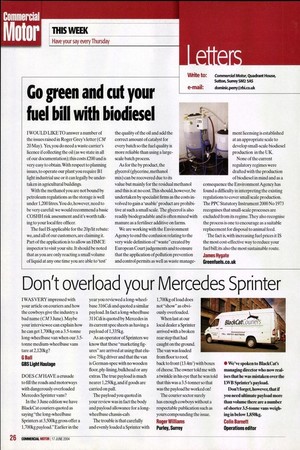Go green and cut your fuel bill with biodiesel
Page 24

If you've noticed an error in this article please click here to report it so we can fix it.
I WOULD LIKE TO answer a number of the issues raised in Roger Grey's letter (CM 20 May). Yes, you do need a waste carrier's licence if collecting the oil (as we state in all of our documentation); this costs £200 and is very easy to obtain. With respect to planning issues, to operate our plant you require B1 light industrial use or it can legally be undertaken in agricultural buildings.
With the methanol you are not bound by petroleum regulations as the storage is well under 1,200 litres. You do, however, need to be very careful: we would recommend a basic COSHH risk assessment and it's worth talking to your local fire officer. The fuel IS applicable for the 20p/lit rebate: we, and all of our customers, are claiming it. Part of the application is to allow an HMCE inspector to visit your site. It should be noted that as you are only reacting a small volume of liquid at any one time you are able to 'test'
the quality of the oil and add the correct amount of catalyst for every batch so the fuel quality is more reliable than using a largescale batch process.
As for the by product, the glycerol (glycerine, methanol mix) can be recovered due to its value but mainly for the residual methanol and this is at no cost.This should, however, be undertaken by specialist firms as the costs involved to gain a 'usable' product are prohibitive at such a small scale. The glycerol is also readily biodegradable and is often mixed with manure as a fertiliser additive on farms.
As for the by product, the glycerol (glycerine, methanol mix) can be recovered due to its value but mainly for the residual methanol and this is at no cost.This should, however, be undertaken by specialist firms as the costs involved to gain a 'usable' product are prohibitive at such a small scale. The glycerol is also readily biodegradable and is often mixed with manure as a fertiliser additive on farms. We are working with the Environment Agency to end the confusion relating to the very wide definition of "waste" created by European Court judgements and to ensure that the application of pollution prevention and control permits as well as waste manage
ment licensing is established at an appropriate scale to develop small-scale biodiesel production in the UK.
None of the current regulatory regimes were drafted with the production of biodiesel in mind and as a consequence the Environment Agency has found a difficulty in interpreting the existing regulations to cover small scale production. The PPC Statutory Instrument 2000 No 1973 recognises that small-scale processes are excluded from its regime.They also recognise the process is one to encourage as a suitable replacement for disposal to animal feed.
None of the current regulatory regimes were drafted with the production of biodiesel in mind and as a consequence the Environment Agency has found a difficulty in interpreting the existing regulations to cover small scale production. The PPC Statutory Instrument 2000 No 1973 recognises that small-scale processes are excluded from its regime.They also recognise the process is one to encourage as a suitable replacement for disposal to animal feed.
The fact is, with increasing fuel prices it IS the most cost-effective way to reduce your fuel bill; its also the most sustainable route. James Hygate Greenfuels.co.uk




























































































































































































